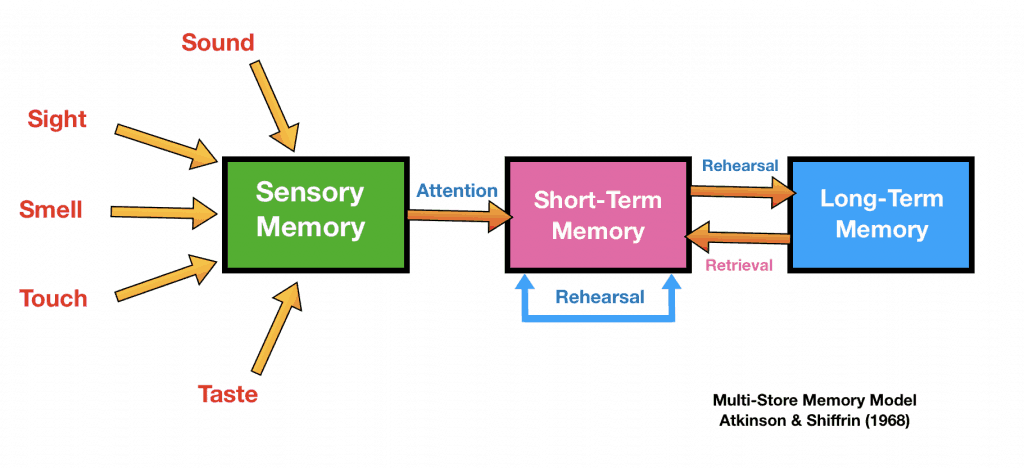Photo AI
Last Updated Sep 26, 2025
Memory Stores Simplified Revision Notes for A-Level OCR Psychology
Revision notes with simplified explanations to understand Memory Stores quickly and effectively.
343+ students studying
2.1.1 Memory Stores
Memory
The process of maintaining information from past experiences over time in order to use this information in the present
Memory encoding = Transforming information to put it into memory
Memory storage = Maintaining information in our minds
Memory retrieval = Taking information out of memory storage
Memory recall = Consciously re-accessing a memory without having to be reminded of it first
Memory recognition = Ability to retrieve a memory after being shown it again, due to it feeling familiar
Introduction to the Multi-store model
The multi-store memory model (MSM) represents how memory is stored, transferred between the different stores, retrieved and forgotten.
There are 3 stores: the sensory register, short-term memory and long-term memory.

The three properties in which memory stores can vary:
- Coding
- Capacity
- Duration Capacity = How much information can be stored
Duration = How long information can be stored for
Coding = What format information is stored in
Types of coding - Information can be coded in a sensory code or a semantic code:
Sensory coding = Storing sensory information
Types:
Acoustic code = Storing information as sound
Visual code = Storing information as images
Semantic coding = Storing information by its meaning
The sensory register
= Holds information for a very short duration whilst we process it
- Short duration of 1-2 seconds (Sperling)
- Large capacity as it receives information from all of our senses (Sperling) The coding is sensory
Key study:
Sperling - Conducted a lab experiment investigating the capacity of the sensory register
Procedure:
Presented participants with a 4 x3 grid of letters for 50 milliseconds and immediately tested their recall of the letters
Two conditions:
-
Participants were asked to recall as many letters as possible
-
Participants were asked to recall just one row of letters after having seen the grid
Results:
In 1 condition where participants had to recall the entire grid, they usually recalled around 4-7 letters. When participants were asked to recall only one of the rows, they usually recalled around 3 letters
Conclusion:
The sensory register has a very short duration of 1-2 seconds, which gets worse with age, but a large capacity since it receives information from all of our senses
- Therefore, information will only pass from the sensory register to the short-term memory store if we pay attention to it.
Summary paragraph: The sensory register is coded in a sensory code. It has a short duration of 1-2 seconds, as discovered by Sperling. This can get worse with age, but a large capacity as it receives information from all of our senses.
500K+ Students Use These Powerful Tools to Master Memory Stores For their A-Level Exams.
Enhance your understanding with flashcards, quizzes, and exams—designed to help you grasp key concepts, reinforce learning, and master any topic with confidence!
50 flashcards
Flashcards on Memory Stores
Revise key concepts with interactive flashcards.
Try Psychology Flashcards5 quizzes
Quizzes on Memory Stores
Test your knowledge with fun and engaging quizzes.
Try Psychology Quizzes29 questions
Exam questions on Memory Stores
Boost your confidence with real exam questions.
Try Psychology Questions27 exams created
Exam Builder on Memory Stores
Create custom exams across topics for better practice!
Try Psychology exam builder18 papers
Past Papers on Memory Stores
Practice past papers to reinforce exam experience.
Try Psychology Past PapersOther Revision Notes related to Memory Stores you should explore
Discover More Revision Notes Related to Memory Stores to Deepen Your Understanding and Improve Your Mastery
96%
114 rated
The Multi-Store Model of Memory
Multi-Store Model of Memory
289+ studying
189KViews